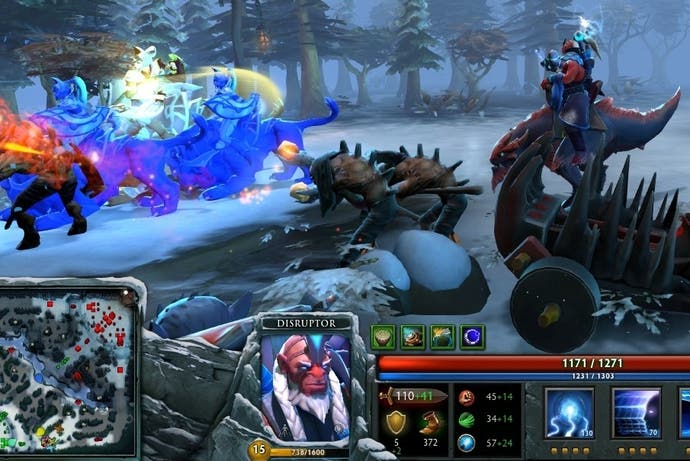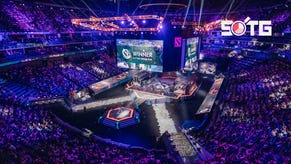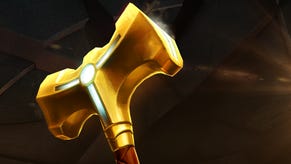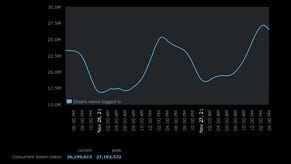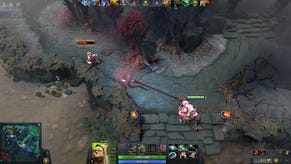Games of 2013: Dota 2
Towering example.
The best item in Dota 2 is the Force Staff.
All right, that might be a silly claim to make. Dota 2 players have dozens of items at their disposal, a motley arsenal that lives in an eccentric toolbox. Many of these items have unique abilities that are particularly useful in certain contexts, in specific situations. It's all very nuanced.
Nevertheless, the best item in Dota 2 is the Force Staff.
The Force Staff thrusts somebody forward a short distance. That might be you, it might be a member of your team, it might be an opponent. It does so with a slapstick suddenness that can save lives, perhaps hurling someone out of the area of effect of a dangerous spell, or it can disorientate an enemy or help you bear down on a fleeing foe. It's also perfect for harassing your own teammates during downtime, propelling them back and forth without any warning.
Naturally, this is mostly what I use it for.
Other items and/or hero powers that I've had far too much fun with include a power that turns my entire team invisible (allowing us to stalk the map unseen and hunt the unsuspecting), a power that conjures a ring of flaming snakes (aim it well and you trap someone within) and a staff that throws people up in the air, spinning them around in a miniature tornado. You can even use the latter on yourself in the name of a) self-defence or b) showing off. In my case, it's about a 50-50 split.
You might think I'm not taking this game seriously enough, but everyone I play with is having fun the same way. We try out new combinations of items and powers to see both how effective they are in a fight, but also how unexpectedly hilarious the results might be. I've spent a whole year doing this and it's not just that I've yet to be bored, it's that I still feel I haven't even started. This, for me, is Dota 2.
I didn't expect to warm to it so much and certainly not for it to become one of my favourite games of the year. The first impression is of a game that's just about leading those constantly spawning squads of minions across the map, over and over, helping them slowly fight their way inside the enemy base, but that's only a canvas upon which a far more colourful experience is painted. Dota 2 has a vast roster of distinct heroes, over a hundred and growing, and every team, every five-person combination of these, produces a line-up with particular strengths and weaknesses, a singular recipe that's further seasoned by the items each hero will buy with their hard-won in-game earnings.
It rewards experimentation. It rewards imagination. It rewards those with creativity and a sense of fun, never being more delightful than when you find a new way to confuse, surprise, trap or escape your enemies. True, somewhere amongst your considerations is the amount of raw damage you can inflict, but just as important is your ability to stun, debuff, outrun or outmanoeuvre those you fight. The best Dota 2 players are canny and the best teams work like miscreant chefs, cooking up all kinds of new mischief.
It was all that I could do not to turn this feature into a long, rambling list of all my favourite tricks and tactics. I'd be happy to talk for a long, long time about stacking stuns, hiding all-seeing wards or turning my rivals into sheep, pigs and chickens (one after the other), but all this is still only part of what Dota 2 has given me this past year. In spite of what you might think, I am actually taking it very seriously and I have a lot of respect for what it's taught both me and many of its other players.
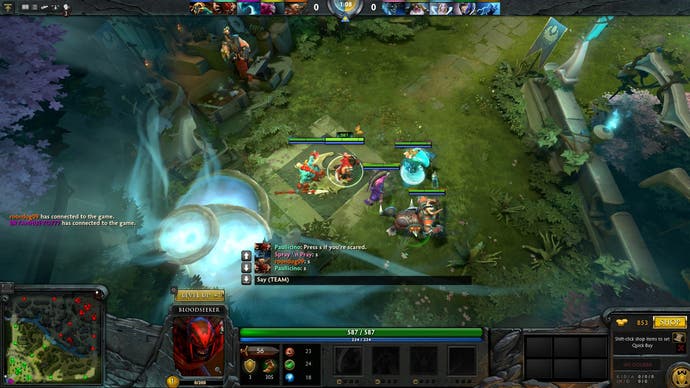
Because it's taught us how to lose. Before Dota 2, most of the games I played online were pretty casual affairs, the sort of thing you could drop in and out of at will. This is different, demanding a much greater level of commitment, by not only asking me to play matches that might last from 40 minutes to over an hour, but also to ride the defeats right through to the end, to fully suffer those losses.
Dota 2 punishes those who abandon games by relegating them to inferior matchmaking pools. But by insisting they play matches to their conclusion, it also gives them the opportunity to turn games around, it forces them to persist and sometimes, sometimes, this means victory bursts forth from the fetid gob of defeat as if forced out by a violent Heimlich manoeuvre. Those who might otherwise quit when backed into a corner are occasionally capable of great things - and Dota 2's balancing presents slim but tangible opportunities for those losing to claw their way back.
Don't for a moment think this is common. More often than not, you just have to watch everything crumble around you and weather it with decorum. It's not an experience that the capricious, flighty video gamer has to suffer very often and yet it's commonplace to many professional sportspeople, who face defeat on a regular basis. I'd like to think it's made me a little more stoic, a little more dignified.
I've seen the game's community improve, too. The original Dota was a difficult game to get a handle on and, because a new player's naiveté could handicap an entire team, many players were not tolerant of those learning. Newcomers would both struggle to learn the game and also struggle to gain acceptance. For a fan-made mod, this didn't matter, but this was a serious obstacle to Valve growing a community and, of course, making money from something they had invested so much time in.

When I first looked at the Dota 2 beta, two years ago now, I didn't feel at all comfortable among those who were playing, but things have changed significantly since then. The introduction of a peer-review system has seen Valve taking action against those who are offensive and players are much more tolerant, even cordial towards one another. Bad language, while still present, is less common and, should someone suddenly disconnect mid-game, many players will agree to collectively pause to allow the lost soul time to return.
More progress could be made, and there are still players who bring all their rage to the battlefield, but it's encouraging to see change happening and it makes a considerable difference to how strangers play together. The majority of my time in Dota 2 is spent playing with friends, teaming up and talking tactics over voice comms, but random matchmaking has granted me some very civil games. As well as ballooning, Dota 2's community has mellowed.
Two years ago I bounced off Dota 2 and was sceptical that I would ever warm to it. I began to think that, like cricket, it would be something that so many others enjoyed, but that I'd never understand the appeal of. I still think the voice acting's cheesy, I still think it has a learning curve that you need a pick to scale, but Valve have made that climb a little easier and, while I'm nowhere near the top even after hundreds of hours of play, I certainly like the view from here. You might well like it too.
Now, hold still. I want to Force Staff you.
